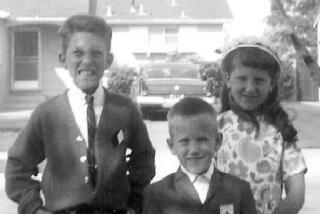‘Wonderland’ Checks In With Levittown
- Share via
The fact that the greater Western world is now wired for celebrity, sound bites and media savvy hasn’t made us wary. On the contrary. Most people now walk around with a news segment’s worth of well-rehearsed hot copy on their lips, waiting for a rolling camera and live mike. We have something to say, we say, and we’re going to say it; Warhol’s fabled 15 minutes of fame is no longer a phenomenon, it’s a right. We are significant, although to prove it, it takes a global village.
In “Wonderland,” John O’Hagan’s sardonic look at that less-than-global but internationally renowned village of Levittown, Long Island, we see people who are more often than not living in time capsules--in some cases, the decor hasn’t changed since William Levitt started building this cookie-cutter community back in 1947. At the same time, they’re creatures of their times. They embrace the camera, they perform, they open their souls and, like a million people they’ve seen on television, they tell us things we never wanted to know.
Chronic candor isn’t their fault, merely a symptom of our freakish times, and O’Hagan is as much a part of this process as anyone. He doesn’t start out to ridicule Levittown or its people, and I’m not sure he ever really does; there’s an undercurrent of real affection for the subjects he includes, partly for their honesty and candor, partly because of the simple things that make their lives complete.
But after a fairly conventional opening--stock footage, a “March of Time” interview with Levitt himself, a discussion of the postwar housing crunch that prompted the building of this first mass-produced community with its cloned streets and GI-friendly prices--things start to get weird.
One woman discusses in great length the ghost in her house; another, in therapy, castigates Levittown itself for every problem. A woman reads a passage from a pornographic novel. “Isn’t that lovely?” she asks. Another, discussing the early years, states matter-of-factly that “one of the principal amusements was wife swapping.” (There’s some difference of opinion, but apparently Levittown was never Cleaver-ville.)
There is no such thing as an objective documentary. A director’s imprint is evident in everything from the camera angles through the editing process. Although O’Hagan never actually intrudes on the scene and allows his Levittowners to speak for themselves, one senses a violation of the pact, as Janet Malcolm has put it, between the chronicler and his subjects: These people had no idea how their words and images were going to be used, how they would be juxtaposed with others and possibly made to look ridiculous.
On the other hand, they’re adult enough to know how these things work, and their verbal enthusiasm belies any fear of broken contracts.
Basically, the movie is funny and sad. Dreams are modest: One man wants to bowl a perfect game; another wants a mink coat for his wife. War veterans perform a ceremonial flag burning with earnestness and awkward dignity; here, O’Hagan almost dares you to laugh, and shame yourself.
The well-known Levittowners he interviews--cartoonist Bill Griffith of “Zippy the Pinhead” fame and aging rocker Eddie Money--got out when they got famous. Miss New York 1996, Keelin Curnuck, pumps iron poolside. A bartender and his wobbly patrons try to remember the words to “The Star-Spangled Banner.” And we try to remember when a place like Levittown was a phenomenon, people were assigned houses in alphabetical order, and anonymity was the norm, not an embarrassment.
*
* Unrated. Times guidelines: There is fleeting adult content in this movie featuring real people, but there is nothing to recommend or keep teenagers from seeing this movie.
‘Wonderland’
A Fox Lorber release. A Rhinestone production in association with Good Machine. Producer-director John O’Hagan. Co-producer Mary Jane Skalski. Executive producers Ted Hope, David Linde and James Schamus. Running time: 1 hour, 20 minutes.
More to Read
The complete guide to home viewing
Get Screen Gab for everything about the TV shows and streaming movies everyone’s talking about.
You may occasionally receive promotional content from the Los Angeles Times.




